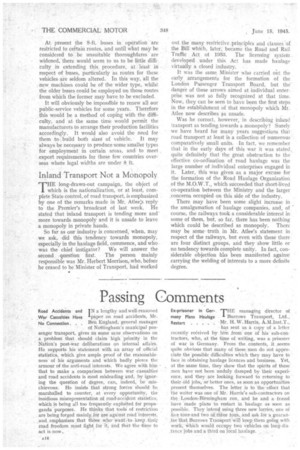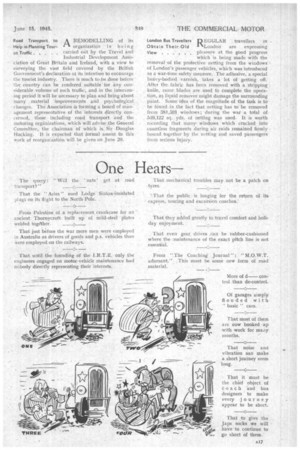Passing Comments
Page 18

Page 19

If you've noticed an error in this article please click here to report it so we can fix it.
Road Accidents and I N a lengthy and well-reasoned War Casualties Have paper on• road accidents, Mr. No Connection. . . Ben England, general manager of Nottingham's muniCipal passenger transport, gives Us some sane observations on a problem that should Claim high priority in the Nation's post-war deliberations on internal affairs, He supports his statement With an array of official statistics, which give ample proof of the reaSonable ness• of his arguments and which badly pierce the armour of the anti-road interests. We agree with him that to make a comparison between virar casualties and road accidents is most misleading and, by ignoring the question of degree, can, indeed, be mischievous. He insists that strong forces should he marshalled to counter; at every opportunity, the insidious misrepresentation of road-accident statistics, which is being all too frequently exploited for propaganda purposes. He thinks'. that tools of restriction are being forged Mainly for use against road interests, and emphasizes that those who 'Want to keep . their road freedom must fight for it and that the time to act is now.. Ex-prisoner in GerTHE managing director of many Plana Haulage Burrows Transport, Ltd., Restart . . . . Mr. H. W. Harris, A. M.Inst.T • has sent us a copy of a letter recently reteivecl by him froth one of sub-contractors, who, at the time of writing, was a. prisoner of war in Germany. From the contents, it ,seems quite obvious that many of these men do not appreciate the possible difficulties which they may have to face in obtaining haulage licences and business. Yet, at the. same time, they show that the spirits of these men have not been unduly damped by their experience, and they are looking forward to returning to their-old jobs,. or' better ones, as soon as opportunities present themselves. The letter is to the: effect that the-writer was one of Mr. Harris's sub-contractors on the London-Birmingham run, and he and. a friend have made plans to. restart in haulage as soon as possible. They intend using three new. lorries; one of five tons-and two G4tIA-ee tons. „and ask for a guarantee that Burrows Trarisport will keekthem going. with work Which would occupy two vehicles cm long-dis tance jobs and a third on local haulage. Road Transport to A 13EMODELLING of its l-leip in Planning Tour; organization is being
Est Traffic carried out by the Travel and
Industrial Development Association of Great Britain and Ireland, with a view to surveying the vast field covered by the British Government's declaration ot its intention to entourage the tourist industry. ,T here is much tope done before • the Country can he rendered suitabIefor any considerable volume of such traffic,. and in the intervening period it will be necessary to plan and bring about many material improvements and psychological changes. The Association is forming a board of man-. agement representative of the interests directly concerned, these including road transport and the mcitoring organizations, which will advise .the General Committee, the chairman of which is, Sir Douglas Hacking. It is expected that formal assent to this ivork of reorganization Will be given on June 20. London Bus Travellers pp EGULAR . travellers ;n Obtain Their Old "London are expressing View pleasure at the good progress which is being made with the removal of the protective netting from the windows of London's passenger vehicles, which was introduced as a war-time safety measure. The adhesive, a special heavysbodied varnish, takes a lot of getting off. After the fabric has been removed with a stripping knife, razor blades are used to complete the Operation, .a5 liquid remover might damage the surrounding paint. Some idea of the magnitude of the task is to he found in the fact that netting has to be removed from 381,591. windows; during the war a total of 549,122 sq., yds. of netting was used. It is worth recording that manyWindoWs. which cracked into countless fragments during air raids remained firmly bound together by the netting and saved passengers from serious injury.




















































